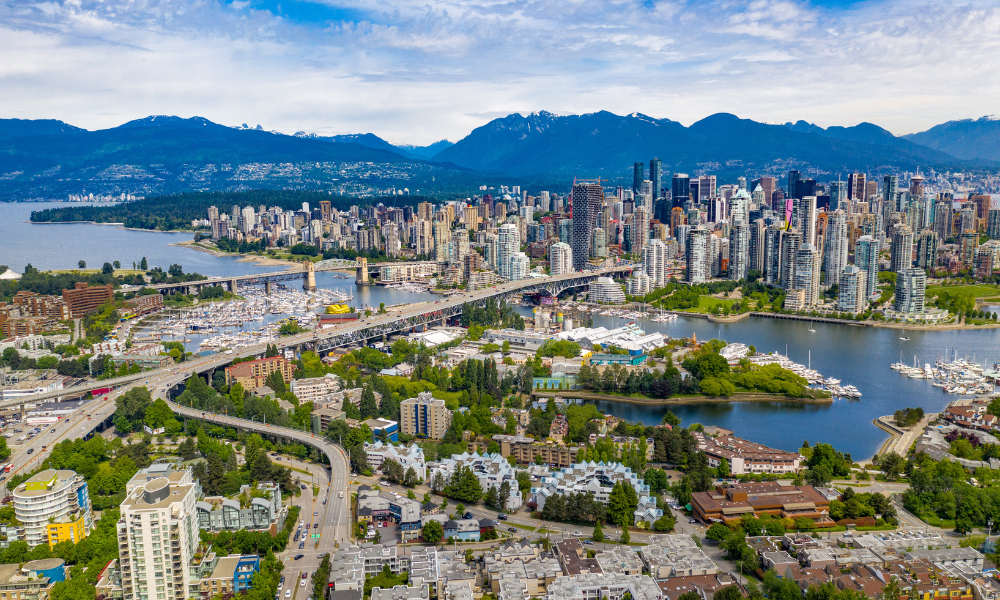Investor demand for condos is plummeting in Vancouver's city centre, raising fears of a Toronto-type crisis

There’s no end in sight to the deep crisis facing the Greater Toronto Area’s condo market – and the outlook has also darkened for condo investors in Vancouver, with a glut of inventory sitting on the market and demand plunging for a property type that was once highly coveted in the city.
Condo sales have fallen through the floor in Toronto over the past three years, nosediving by 75% between 2022’s first quarter and the opening three months of this year. But Vancouver has also seen a steep falloff, Canada Mortgage and Housing Corporation (CMHC) highlighted on Tuesday, as sales activity in its own condo sector plummeted 37% during the same spell.
That’s sparked concerns that the quagmire facing Toronto – with a flood of new supply scheduled to arrive as pre-construction condos complete even while demand craters and investors flee the market – could be about to spread to other Canadian cities.
The core problem in Vancouver seems a similar one to Toronto: tiny units owned or ordered by investors whose purchase no longer makes sense because higher interest rates have turned the property cashflow-negative, lower demand has put downward pressure on rental prices, or sliding property prices have presented an appraisal nightmare upon completion.
“There are a lot of condos that were sold [in Vancouver’s downtown district] in the last three years which are coming up for completion now and most of them were investors,” Justin Prasad (pictured below), a financial advisor at BlueShore Financial (a division of Beem Credit Union), told Canadian Mortgage Professional. “And those are sitting empty. People can’t complete on it, or the price is down dramatically.”

In Toronto, those unit types often take the form of so-called “dog crate” condos, apartments of around 500 square feet (or smaller) gobbled up by investors during the 2010s and early 2020s as rents, property values, and rental demand soared in the city centre and its outskirts.
Prasad said the trend has been mirrored in Vancouver. “What you see is a lot of these kinds of micro-units: one bedroom, one bath,” he said. “I think there was this huge demand for it and they overbuilt on it.
“And now obviously with immigration [falling], students leaving, crackdowns on Airbnbs – there’s been a multitude of factors that I think have contributed to the decline in the condo market, and I don’t think it’s going to change in the next year, year and a half, or two years, right until demand and supply meet and you get equilibrium.”
CMHC says condo crisis could worsen housing outlook
Higher supply is already pulling rental costs lower in both Toronto and Vancouver, offering welcome relief for people in those cities who’ve seen housing and rental affordability slide alarmingly over the last decade.
But CMHC has also flagged the danger posed to the housing market outlook by the condo slowdown in Canada’s two priciest cities, noting that builders and developers have stepped back from the scene in recent years amid that alarming cooling-off in activity.
“While the growing inventories are leading to lower sale prices and asking rents for buyers and renters in the most expensive centres in the country, these factors also put downward pressure on new condo supply,” the national housing agency said on Tuesday.
“Between 2022 and 2024, the number of cancelled units in Toronto and Vancouver increased five- and ten-fold, respectively. This presents a challenge for both the existing housing shortage and future supply growth.”
Leah Zlatkin of LowestRates .ca is urging first-time buyers to act wisely in Toronto’s cooling market. From waiting too long for rate cuts to underestimating ownership costs, Zlatkin breaks down key missteps to avoid. https://t.co/67hR4jmTP4
— Canadian Mortgage Professional Magazine (@CMPmagazine) May 30, 2025
Buyers begin to abandon units as investor purchase turns sour
Plenty of buyers who purchased pre-con units in Toronto have been left scrambling to make up the difference between the agreed amount and a sometimes significantly lower appraised value upon completion.
That’s resulted in growing reports of buyers abandoning their deposits and walking away from the purchase, leaving developers in the lurch and, in many cases, facing the prospect of a protracted legal tussle.
In Vancouver, that trend is also emerging – and it could be a while before things get back to any normality where the condo market is concerned, Prasad said. “People walking away from these things is becoming an issue because the scenario that they had in their mind two or three years ago is vastly different than it is now,” he said.
“And I think that it just has to flush itself out until we hit a bit of an equilibrium, which I don’t think will be for another 12 months, 15 months. Until immigration levels and interest rates stabilize, I think nobody’s really rushing to get into the condo market.”
Make sure to get all the latest news to your inbox on Canada’s mortgage and housing markets by signing up for our free daily newsletter here.



